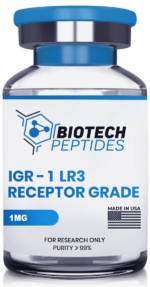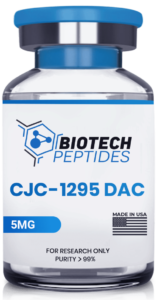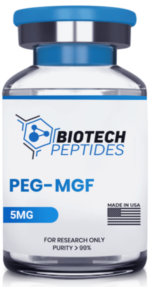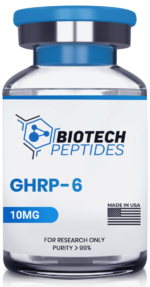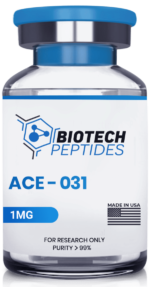Muscle growth – it’s not about the car it’s about the size of the arm hanging out of it. Muscle mass not only looks pretty impressive but it actually has a ton of health benefits like a decreased risk of cardiovascular disease and diabetes.
Peptides for muscle growth have been circulating the market for some time now. Bodybuilders use them when not using Anabolic Steroids to maintain muscle mass.
Us ‘normies’ can use these Growth Hormones to help increase muscle mass for health and a few more gains in the gym. Let’s look at the top 5 peptides for muscle growth.
Key Takeaways
- The best Peptides for muscle growth will all increase Growth Hormone and IGF-1 levels
- Muscle growth depends on more than just peptides – you need to eat and train correctly
- Some of the best peptides for muscle growth include IGF-01 DES, CJC-1295, and PEG-MGF
How We Chose the Best Peptides for Muscle Growth
We didn’t just hop on over to a vendor’s site and pick and choose random peptides willy-nilly, no, we made a real effort to find the best ones. When choosing the best ones there are a few things we considered:
- What the research says about these various peptides. Peptides may seem like performance-enhancing drugs but they can be used in the medical world and therefore there are plenty of studies. Looking at these and seeing if they use the correct dosage and what the effects were are key for seeing which Peptides for muscle growth are good
- Side effects will be present. For instance, Human Growth Hormone boosters will probably increase insulin resistance. If you are already a pre-diabetic then you’d wanna avoid this. Most peptides are perfectly fine, but you have to make sure you do not use the wrong ones
- Reviews from users online. Looking at how much muscle people have gained from these peptides can give you insight into how effective these peptides actually are. Peptides work, but how well they work depends from person to person
This last one is for you, not us, but are you actually working hard enough to justify using Peptides? Are you eating enough food, training hard enough, and sleeping enough? If you answer yes to all of these then we can keep moving forward.
IGF-1 LR3
Humans produce IGF-1 (insulin-like growth factor 1) throughout our lives but levels start to drop as we age. This is completely normal but increased IGF-1 levels have been linked to some amazing physical results.
IGF-1 binds to all the cells in the human body, meaning it can increase muscle mass, and bone density, help with fat loss, and even improve your skin and hair health.
IGF-1 doesn’t really have a lot of side effects. The one thing you might notice is that you see a drop in blood sugar levels, similar (but far less) to what Insulin would do. IGF-1 is also a cancer risk and can cause cancer cell growth, so, if you are prone to it this might be dangerous.
IGF-1 LR3
The body usually produces enough IGF-1 but more has been linked to better muscle growth and greater fat loss – what’s not to love? IGF-1 is released by the liver and will bind to all cells in the body hence why it has an effect on everything.
IGF-1 LR3 is the long-release version that increases the actual time of action in the blood. This beats regular IGF-1 ten-to-one and will be far better for overall results.
You can also expect a drop in blood sugar levels once you’ve injected it, so, be careful. IGF-1 DES is a similarly good option.
CJC 1295
CJC-1295 is known as a Growth Hormone Releasing Hormone. These will stimulate the pituitary gland to produce, release, and pulsate more Growth Hormone.
Growth Hormone will increase lipolysis (fat loss) directly from the adipocytes (fat cells). Growth Hormone will also cause the liver to release IGF-1 which has been linked to muscle growth, muscle repair, improve body composition, and even better hair and skin health.
As far as side effects go there is only really one to worry about – insulin resistance. The HGH will cause more insulin and glycogen (from the liver) to be dumped into the blood which can eventually lead to insulin resistance.
CJC 1295
CJC 1295 is known as a Growth Hormone Releasing Hormone. This will cause the pituitary gland to produce, secrete, and pulsate more Growth Hormone into the bloodstream.
HGH has been linked to increased fat loss through its ability to increase lipolysis. It will also increase IGF-1 levels throughout the body which have been linked to fat loss, muscle gain, bone health, skin health, and even better hair.
You are best taking a GHRH with a GHRP for optimal results.
PEG-MGF
PEG-MGF is an undervalued peptide therapy that can be used to build muscle in the right scenarios. Pegylated Mechano-growth factor is an altered version of insulin-like growth factor.
Not only will PEG-MGF stimulate the IGF-1 receptors similar to IGF-1 but it will also improve the recruitment of macrophages and neutrophils in muscles that have recently been trained.
In order for PEG-MGF to work you have to already be training hard since the main way PEG-MGF helps is by improving recovery time and overall cell regeneration.
Side effects of PEG-MGF don’t really exist, but you will experience some inflammation at the injection sites.
PEG-MGF
PEG-MGf is an underrated peptide that is an analog or altered version of the IGF-1, a compound that literally binds to every single cell in the body to cause growth.
MGF will stimulate the IGF-1 receptor but it will also improve the recruitment of macrophages and neutrophils in muscles that have recently been trained.
Another way of looking at it is that it stimulates myoblasts division and allows for muscle fibers to fuse and mature. This is essential for adult muscle growth.
GHRP-6
Whenever you want to build muscle mass we usually all struggle with hunger – we simply cannot eat enough. This can be a limiting factor and if you want to encourage muscle growth you want to keep your diet rich in calories.
GHRP-6 is one of the Growth Hormone Releasing Peptides that can massively boost hunger levels and will also help the anterior pituitary gland produce more human growth hormone.
All GHRPs are best used with a GHRH since the two work together in a natural process and together they work amazing – way more of the body’s natural production of growth.
Side effects are, of course, the hunger. But to most that won’t necessarily be a side effect.
GHRP-6
Growth hormone-releasing peptides (GHRPs) essentially trigger the release of growth hormone from the anterior pituitary gland. The widely used growth hormone-releasing peptides (GHRPs) are GHRP-2 and GHRP-6.
GHRP-6 is a synthetic growth hormone secretagogue (GHS). GHRP-6 activates the ghrelin by binding to ghrelin receptors, which sends signals to the anterior pituitary gland for an increased release of growth hormone.
One thing to note is that GHRP-6 will make you really hungry. Like nothing you’ve had before.
ACE-031
ACE-031 is a peptide that has been developed to be a myostatin inhibitor. It is made up of activin receptor type IIB and the immunoglobulin G1-Fc (IgG1-Fc).
Without getting too complicated, it will bind to the Myostatin in the blood and leave it inactive. Myostatin is a skeletal muscle growth inhibitor (silly) and by reducing the amount you have you could unlock a lot of muscle growth.
It has to be said that any Myostatin inhibitor still needs to be researched, and will not boost protein synthesis itself, and studies suggest while it’s great at increasing muscle growth for size, it’s not great for strength gain.
ACE-031
ACE-031 is a fusion protein of activin receptor type IIB and IgG1-Fc, which binds myostatin and related ligands. ACE-031 promotes muscle growth by binding to myostatin and other negative regulators of muscle mass.
ACE-031 is one of the lesser-known peptides along with Follistatin, and both have the potential to unlock a world of gains in your body.
One thing to note is while this is great for size, it might not be great for strength.
How do Peptides Increase Muscle Growth
There are a myriad of different muscle growth peptides online and while most of them will aid in muscle gain in one way or another you still need to do your part (no surprise there). This will work in tandem with peptides to be the building blocks of building your lean muscle mass. Here is how peptides increase muscle growth:
- Increased muscle protein synthesis is the driving force behind adaptive responses to exercise. All of the peptides that increase growth hormone secretion will increase IGF-1. IGF-1 increases skeletal muscle protein synthesis via PI3K/Akt/mTOR and PI3K/Akt/GSK3β pathways (1)
- Increased human growth hormone will dump more food into your blood and also increase IGF-1 release. The latter has been linked to sarcoplasmic growth, which is the growth of new muscle fibers rather than just increasing the size of the current muscle fibers (2)
- Improved recovery time by increasing Human Growth Hormone, IGF-1, and other hormone production. Certain peptides can help gain muscle by reducing inflammation, healing injuries, or increasing Testosterone levels
There are plenty of peptides on the market each with its own benefits. You have to do research on each one to find the ones which are best for you.
Side Effects of Peptides for Muscle Growth
As always, there are side effects to peptides. Peptides work but because of the way they impact certain hormones in the human body they can have side effects – depending on how you use them.
- Insulin resistance will be prominent if you use too much growth hormone-releasing hormone or peptide. These release a significant amount of GH into the system that’ll lead your liver to dump glycogen into the blood and that raises blood sugar levels. This is unlikely to happen if you are trying to lose weight
- Cancer risks will be there with peptides that increase IGF-1 levels. IGF-1 will bind to each and every cell in the body to cause growth – including cancer cells. More research on this is needed
- Water retention will take place with peptides that increase HGH production. HGH has a tendency to cause a bit of water retention, but this can easily be managed with a good diet and training plan
Results of Muscle-Building Peptides
On IFG-1 DES, Reddit user had the following to say
“IGF1 DES (LR3 would work too) @ 80mcg-120mcg pinned bilaterally in target muscle directly before working that muscle. Sometimes if Im doing multiple muscles I’ll wait to pin it later bc I’ll pair a strong muscle of mine with a weak one. So maybe I do chest and biceps…my chest is fine and will already get ridiculous pump from everything else. I’ll do my chest to completion..then pin igf1 des in my biceps then take my time warming them up..2 or 3 slow warmup sets. Then game on..unlesh the Karmen and hope ur gym has good lighting for the IG bc that pump is going to be borderline illegal.”
One ACE-031, Reddit user had the following to say:
“It was an experiment but this stuff is too expensive to be run at good dosage. I pinned it in my triceps and it “seems” to have an inflamatory effect. My triceps seems to be “fuller” after that but I can’t testify it with correct scientific evidence.”
Conclusion: Best Peptides for Muscle Growth
It’s no secret that peptides promote muscle growth, but not all of them can help you as much as the marketing companies would claim. To look at which ones are effective you would need to compare what the studies suggest combined with what the reviews are saying.
The best ones for muscle growth are the ones that increase growth hormone (growth hormone secretagogues) and perhaps some other ones like ACE-031. IGF-01 is also another great option and is widely respected as one of the best muscle-building peptides.
Whatever you do, you’d have to be willing to train just as hard and diet even harder if you are willing to use peptides.
FAQs
Are peptides worth it for muscle growth?
Sort of. They will never be as good for muscle gain as Steroids or SARMs, but the side effects are so few compared to those two it may become worth it. Peptides work, and they can increase muscle gain, however, you need to be patient and work incredibly hard in order to gain results.
What you need to know about peptides bodybuilding?
Each peptide works individually. Some only work for wound healing, some increase sexual function, while others simply help with weight loss. Understanding how your peptide works and how to train/diet along with it for optimal results is key. You should also be aware of the side effects.
Are peptides safe for building muscle?
For the most part, yes. Certain peptides do have side effects due to their mechanism of action but most peptides are perfectly fine and won’t have any real sides. You need to look at each peptide individually to find the side effects.
References
1) Yoshida T, Delafontaine P. Mechanisms of IGF-1-Mediated Regulation of Skeletal Muscle Hypertrophy and Atrophy. Cells. 2020 Aug 26;9(9):1970. doi: 10.3390/cells9091970. PMID: 32858949; PMCID: PMC7564605.
2) Roberts MD, Haun CT, Vann CG, Osburn SC, Young KC. Sarcoplasmic Hypertrophy in Skeletal Muscle: A Scientific “Unicorn” or Resistance Training Adaptation? Front Physiol. 2020 Jul 14;11:816. doi: 10.3389/fphys.2020.00816. PMID: 32760293; PMCID: PMC7372125.
- 5 Best Peptides for Hair Growth – For Regrowth & Hair Loss - May 19, 2023
- 5 Best Peptides for Muscle Growth – Dosages and Real-Life Results - May 15, 2023
- 5 Best Peptides for Anti Aging & Skin Health - May 9, 2023




